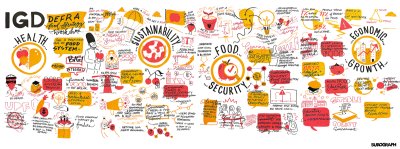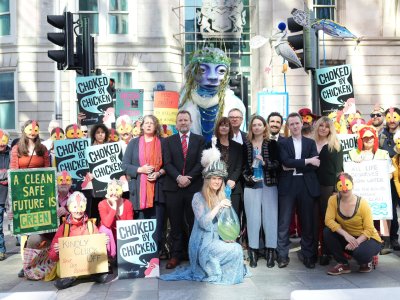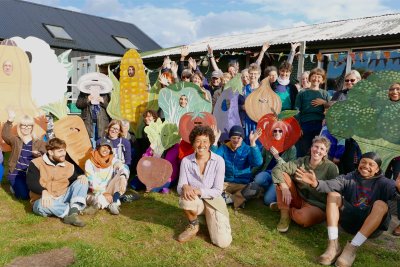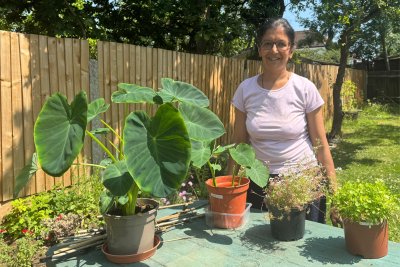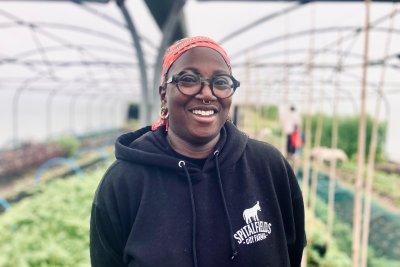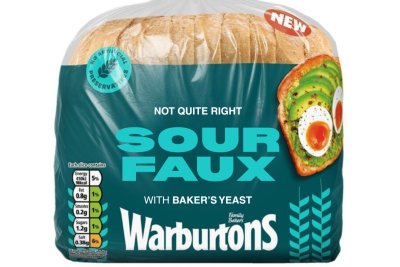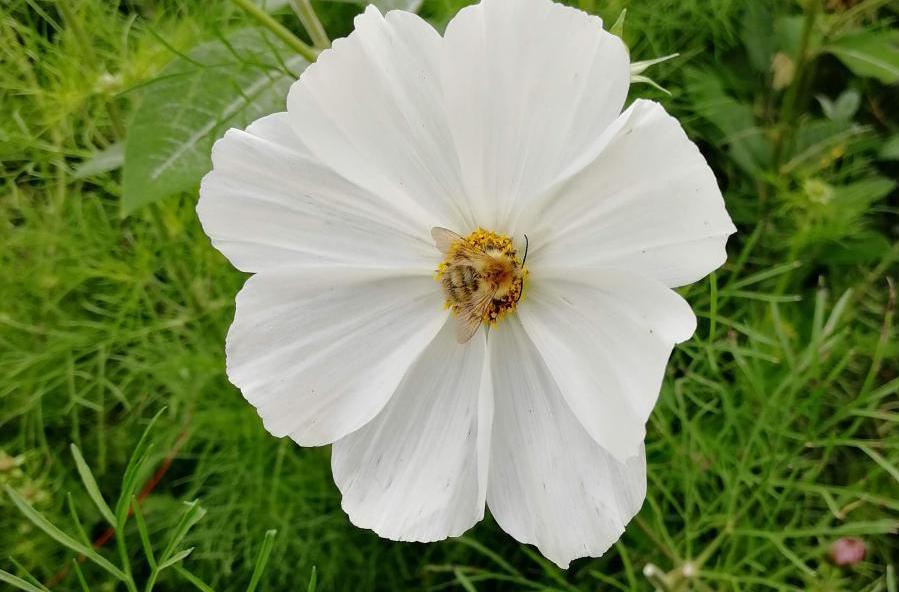 common carder bee on organic farm credit: V Hird
common carder bee on organic farm credit: V Hird

Regenerative farming under the spotlight
What looks like sustainable farming, sounds like sustainable farming, maybe but isn't really. Our Head of Farming, Vicki Hird delves into the murky world of farm system definitions.
My heart sinks at reading yet another article about ‘regenerative’ agriculture that suggests it “it goes further than an organic approach because it aims to repair environmental damage”. Or when I see huge corporations promoting their plans to ‘help’ farmers save the planet and achieve net zero carbon emissions.
As with so many other such pieces it suggests regenerative is all shiny new, better and will tackle climate emissions everywhere. The hype is huge and there are new promotions, labels, and high-level support being generated. If done well, regenerative approaches could be a force for good; genuinely supporting farmers to do more for climate, nature and the environment. Done badly, it won’t.
And what about all the fantastic organic, permaculture and biodynamic farmers, here and globally, who have delivered a sustainable, regenerative approach, building on the hard work of organic principles for decades, despite the system continuing to reward intensive, monoculture farming and food uniformity? Organic farmers don’t get much reward in conventional markets as the huge mark-ups largely doesn’t reach them. Whether they will be rewarded properly within the new ‘public money for public goods’ approach in UK farm support currently hangs in the balance. Meanwhile, consumers are going to get highly confused by a plethora of marketing claims, labels and hype.
Consumers are going to get highly confused by a plethora of marketing claims, labels and hype.
Corporate ‘Regen’
I read that Nestlé – the world’s largest food company that brings us vast amounts of plastic bottled water (draining natural water systems), confectionery, high sugar foods, and marketing baby milk that undermines breastfeeding - knows how to do ‘regenerative farming’. For me, the alarm bells start to ring. Cargill – the world’s largest grain trader – is also apparently ‘leading’ the way. These huge global grain traders and food corporations like General Mills, Danone, and so on, are all heavily promoting how they are supporting their farmers to use 'regenerative approaches'.
But are they themselves changing what they do and their business model that has made them so rich and powerful, to enable it? Their systems rely on extremely large quantities of raw materials from wherever it is cheapest and from an extremely narrow list of farm outputs (oilseeds, grains, sugar, cheap dairy and so on), converting that to ultra-processed products, wrapped in glossy packaging and expensive marketing, to sell the world over. This continues to dominate and take over local markets and local businesses. Earlier this year, a report by Unearthed found that Cargill were a leading cause of deforestation and land grabbing in the Cerrado of Brazil due to their push for chicken feed products. This feed was imported to the UK and used by poultry farmers that supply the big supermarkets and fast-food chains. Until this kind of practice stops, we must push back on bogus claims around corporations claiming to be ‘regenerative’.
Their systems rely on extremely large quantities of raw materials from wherever it is cheapest and from an extremely narrow list of farm outputs
As an aside, you can read how the narrowing of our food base is at a critical point in Dan Saladino’s excellent new book Eating to Extinction: The World’s Rarest Foods and Why We Need to Save Them.
Maybe I should not dismiss corporate hyped ‘regen’ farming - given their power and wealth? Nestle talk of the half million farmers they 'work with'. Yes, we do need to get the whole food system moving in the right direction. There is a big soil focus and that’s useful. Some soil may be protected and some nature restored and some carbon sequestered...for a while.
But overall, the risky monoculture, high input, cheap output, uniform approaches these giant companies are built on - pushing all the risk down on to the producers and away from shareholders, hedge funds or private owners - are at the heart of their business model and are unlikely to drive the fundamental changes we need.
And that is the problem, because the climate, nature and our waistlines are telling us we need fundamental change to happen now.
Away from the hype
What we don’t really need to be doing is to pitch farmers against farmers in a divisive way, creating a battle between different ways of farming. We need people to work together and bring them along on that journey and get genuine ‘regenerative’, ‘organic’ and ‘agroecology’ adopted by all, with transparency and accountability at all levels.
What we don’t really need to be doing is to pitch farmers against farmers in a divisive way, creating a battle between different ways of farming.
We need governments, farm bodies, and the market to be supporting all farmers attempting to farm with nature not against it, to diversify cropping and livestock systems, to reduce unsustainable inputs and to get a fair reward for doing it. To do – indeed - what organic farmers have been working at for half a century.
This isn’t a nice marketing scheme or a tick-box exercise, but how we can still feed ourselves and future generations, to ensure nature is restored and climate emissions from farming, including deforestation for feeds and so on, are reduced. It is essential, as the UN has pointed out. And fairness must go hand in hand with carbon reduction and nature restoration.
I'm terrified for the future frankly, if old style farms fail in the face of climatic induced wild weather patterns. We face the strong possibility that nature and ecosystems will continue to decline, with food becoming ever more processed or worse, have to be largely factory based, injected with a cocktail of vitamins and minerals not nearly replicating the complex soil related interactions with our gut biome.
I'm terrified for the future frankly, if old style farms fail in the face of climatic induced wild weather patterns.
Take one marker for sustainability affected by farming - the invertebrates.. My new book, Rebugging the Planet, looks at why we need to be protecting the bugs better. In one chapter I have a tale of two farms – one which is genuinely regenerative, mixed, low input, using integrated pest management, lots of rotations and so on and one that is not – and the latter is the one that can make a profit. It’s clear that to save the bugs, and all the nature, including us, connected with them, we need to farm and eat differently. Farming with fewer chemicals, more complex rotations, soil health measures, different and diverse plants and far less but more diverse livestock and fisheries. That's the minimum.
Regenerative approaches that do all this are great, i.e. not only protecting soils (vital though that is), but changing the whole system towards agroecological principles. Farmers need the market place that will allow them to make a decent living farming doing that.
I am hopeful. Consumers are clamouring for fresh, for provenance, for organic food and there are more decent routes to market for farmers – many grew during the Covid lockdowns in response to massive local demand. Groundswell, Innovative Farmers and similar initiatives too give me hope. FarmED describes how "the techniques used on every farm and every field are going to be different, but it’s all about rebuilding, and reversing the accumulation of greenhouse gasses and climate change.” In the USA there is a new organic certification model being promoted called Regenerative Organic Certified. Maybe that is one of the answers?
This direction of travel is good and needs to be replicated everywhere, speeded up, and supported by new farm policy, subsidies, advice and demonstration and new routes to market that understand and reward the approaches.
I don’t honestly believe that the version of ‘regen ag’ promoted by the Nestlés and Cargills of this world will solve the problem – often highly focussed on measuring soil carbon levels, which is only one part of the picture. It is all too often connected with finance for offsetting. They know however that ‘apparent’ sustainability sells – as a recent interview of Nestle CEO, Mark Schneider notes “Sustainability concerns among its younger customers were [ “off the charts” and a major influence on purchasing decisions. […] So they want to sell sustainability values in their range of highly processed products.”
Regen as a carbon offset - what’s being measured?
Verification and certification are major buzz words in the regen agriculture world. There is a huge drive to get carbon ‘offsets’ and credits via land use change – a company, say an airline, pays farmers to take in and ‘store carbon’ in soil or in trees so they can keep emitting greenhouse gas, but still look good.
This is where truly regenerative farmers need to push back and make sure it is not co-opted and becomes the next meaningless term. The farming sector offsetting anything but its own emissions fills me with dread and soil carbon is notoriously difficult to measure and verify. Industrial energy crops like maize, huge biomass demand, tree plantations, and more, are of interest to government and businesses.
Many tenant farmers fear being thrown off their land so landowners can make more money from offsetting via tree palnting and livestock farmers wonder where they will source fodder and land is given over to energy crops like maize. This is happening globally. I would need another blog to summarise the risks, and opportunities (there will be some), of this offsetting goldrush. But soil is a hugely complex structure and process. We don’t yet have government backed, independent carbon assessments, so dishonest claims may be made and offsetting driven ahead with huge investments by corporations and individuals wanting to show green credentials whilst still pumping greenhouse gasses into the air.
What next
It’s a bit of the Wild West out there in terms of new marketing terms, names for agricultural practices and offsetting frenzies. It will settle down. If ‘regenerative’ goes down the route of becoming a PR term without much behind it, how can we be sure that farmers using it are doing all the principles of truly regenerative farming? A few tweaks and lots of fancy marketing and carbon data are far from what's needed.
Strong and enforced regulation should ensure claims are verified, that ‘offsetting’ is fair and doesn’t lead to unintended damaging consequences and that global corporations have to report on and act to reduce their harmful ecological and social impacts. Such businesses must also revisit their business models so they are based on fair rewards for producers, that agroecological methods, and that don't force farmers and growers anywhere actually to ‘degenerate’ the land, workers, wildlife and animals.
Sustainable Farming Campaign: Pushing for the integration of sustainable farming into local, regional and national government policies.
Sustain
The Green House
244-254 Cambridge Heath Road
London E2 9DA
020 3559 6777
sustain@sustainweb.org
Sustain advocates food and agriculture policies and practices that enhance the health and welfare of people and animals, improve the working and living environment, promote equity and enrich society and culture.
© Sustain 2025
Registered charity (no. 1018643)
Data privacy & cookies
Icons by Icons8
